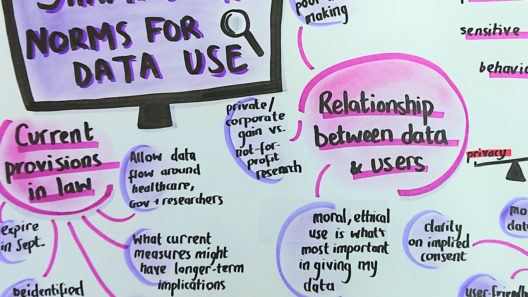How charting public perspectives can show the way to unlocking the benefits of location data
A review of existing research on public attitudes towards location data and related ethical considerations
27 May 2021
Reading time: 6 minutes

The need to balance location data’s vast opportunities and potential ethical concerns makes it vital that its use is responsible, as recognised in aims outlined in the UK’s Geospatial Strategy. Unlocking the benefits of location data therefore requires navigating ethical considerations, such as ensuring just and fair outcomes that benefit everyone or determining how location data can be used in proportionate and privacy-preserving ways.
The Geospatial Commission has partnered with Sciencewise, Traverse and the Ada Lovelace Institute in a new project that will open a dialogue with members of the public to gather evidence about their perspectives on the ethics of location data use.
Public dialogues engage a diverse group of people with complex topics, like data ethics, to build a deeper understanding of public expectations, aspirations, questions, experiences, concerns and more. Participants have time and space to consider a range of information, discuss topics with experts and deliberate on the issues with one another.
The Ada Lovelace Institute is working closely with Traverse to bring public voice to the UK’s Geospatial Strategy. To inform the project, we compiled a review of existing research on public attitudes towards location data and related ethical considerations. In this post we share some of those findings, and explore how public dialogue will support the UK in realising the benefits of location data.
Bringing public voices to the ethics of location data
Location data has significant potential to benefit society, the economy and the environment, from supporting the UK’s response to COVID-19, to offering promising new ways for emergency services to locate incidents and people. It may also be used in increasingly groundbreaking ways, like improving how we can monitor and understand people’s mental health.
However, as is the case with many types of data, the increased collection and use of location data raises important ethical questions on issues like privacy and anonymity. This is especially relevant where location data can be linked with other data or used in novel ways, such as where linking open travel data with social media data could relatively easily uncover personal information. The potency of location data to reveal sensitive information about individuals has led to some scholars to call for additional rights to protect individuals from unreasonable data inferences.
The opportunities and ethical questions relating to location data are highlighted by a study published in May that used mobile phone data to research how people’s behaviour changed after they received a COVID-19 vaccine. While this data may support public health officials to plan pandemic response, campaigners and privacy experts have raised questions about the line between monitoring behaviour for research and unjustified surveillance of citizens.
Balancing location data’s opportunities and ethical questions remains a major challenge. Overcoming this requires not only the involvement of experts and innovators, but engagement with members of the public too. Understanding and acknowledging public perspectives is vital to ensuring that the future of location data is trustworthy, acceptable and aligned with societal values.
Fortunately, existing research tells us several crucial things about public perspectives towards the use of data for public benefit.
Known knowns: existing research on public attitudes towards data
Overall, many people support the use of data when it benefits society, such as medical research and improving public services. Findings from a 2018 survey commissioned by the Open Data Institute found that people in the UK were more willing to share data if it’s for public benefit, and a public dialogue led by the Office for National Statistics found that many people feel a key condition for sharing datasets is that it be used for ‘socially beneficial’ purposes. In 2020, a review of public attitudes research found ‘public benefit’ to be a key trend in support for the use of data.
At the same time, there’s growing public concern about how data can be misused and the negative impacts that irresponsible data-driven technologies can create. Doteveryone’s 2020 digital attitudes survey found high levels of public concern about technology driven harms, and that many people feel powerless against the influence of technology companies. These concerns are amplified through high-profile public backlash towards data-driven technologies, such as the 2020 exam-grading algorithm protests.
Research on attitudes towards location data specifically is relatively slim, but suggests that some people are less comfortable sharing location data, even during covid-19. And in the past year the number of people willing to share personal and location data has decreased in most countries. These findings add complexity into the picture of public attitudes towards the use of data: despite support for the benefits data use can bring, many people remain wary about it too.
This growing public recognition of both the opportunities and the risks of data is set against a backdrop of a ‘trust deficit’, first identified by the Royal Statistical Society in 2014, where social media companies, technology companies and retail companies are the least trusted organisations when it comes to data use, the NHS and public institutions are among the most publicly trusted, and national and local government bodies fare somewhere in the middle.
This ‘trust deficit’ is linked to the ethical considerations of data use. Organisations are less trusted when the way they use data is perceived by people as unethical or misaligned with their expectations and values. The fear of falling foul of public expectations is a challenge for innovators who want to realise the benefits of location data without risking public controversy.
Fortunately, public perspectives also offer a solution to this challenge: they provide a vital signal that shows what ethical and trustworthy uses of data look like.
For location data use, current public perspectives signal how, in addition to compliance with data protection laws and principles, some characteristics of trustworthy uses of data include:
- Putting benefits to people and society first, and distributing benefits equitably
- Focusing on transparency around how and why data is used, who’s using it and for what purpose
- Aligning with public values and expectations when setting aims and navigating trade-offs.
Though this is no-doubt a non-exhaustive list, these characteristics do point towards what constitutes ethical and trustworthy uses of data for public benefit.
But for those using location data there aren’t neat, simple solutions for how to do all these things. Some are subjective, moving targets (there’s no single, objective definition of public benefit), and for others the practical mechanisms aren’t yet established (what does ‘good’ transparency actually look like?). Also, there are likely other, as yet unknown steps that data innovators must also take to align with public perspectives and expectations.
Known unknowns: public perspectives as a signal for trustworthy practice
The lack of answers around how to deliver trustworthy and ethical data uses is where some of the current barriers to innovation arise. All too often, ‘ethics’ can be seen as a distraction or complex series of tick-boxes that block innovation. But the reality is that most innovators want to use location data responsibly to benefit society, the economy and the environment, and the barriers lie in determining exactly what the right ethical, responsible, trustworthy data practices look like.
As public perspectives are a valuable signal in overcoming that barrier, this public dialogue therefore represents a crucial step towards unlocking the benefits of location data. It will help to build a better understanding of public hopes and concerns for location data, determine what is acceptable and aligned with social values, and shine a light on what constitutes trustworthy policies and practices. All this will support innovators and policymakers to ensure the benefits of location data are realised.
This article was originally published on the Geospatial Commission’s website.
Image credit: Zbynek Pospisil
Related content

Public dialogue on the ethics of location data
A partnership with Traverse, the Geospatial Commission and Sciencewise to understand public perspectives on the responsible use of location data.

Removing the pump handle – stewarding data at times of public health emergency
By examining our past, we can find lessons for our future - avoiding pitfalls and ensuring equitable outcomes.

The principles of good deliberative practice
Using the principles of good deliberative practice to test a new engagement methodology on the UK Government's response to COVID-19.

A rapid online deliberation on COVID-19 technologies: building public confidence and trust
Considering the question: ‘What would help build public confidence in the use of COVID-19 exit strategy technologies?’